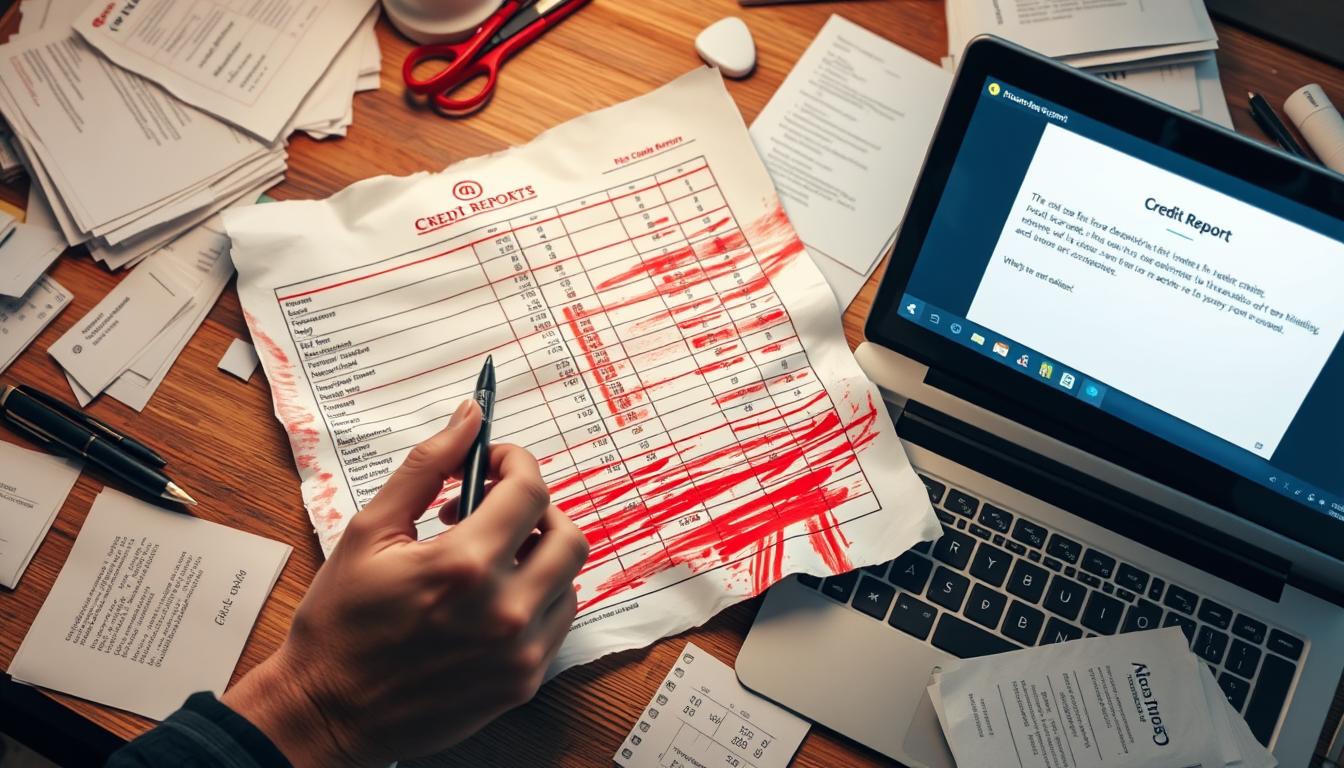You have the right to dispute credit report errors. Experian must act quickly on these disputes. If they don’t, legal action may be necessary.
This guide covers suing Experian to protect your rights. We’ll explore the Fair Credit Reporting Act and reasons for lawsuits. You’ll learn how to file a case against Experian step-by-step.
We’ll discuss inaccurate reporting, unresolved disputes, and data breaches. You’ll discover how to assert your rights and seek compensation. This information empowers you to take action when needed.
Key Takeaways
- Understand your rights under the Fair Credit Reporting Act to dispute inaccuracies and demand prompt investigation from Experian.
- Identify common grounds for taking legal action against Experian, such as inaccurate credit reporting and failure to investigate disputes.
- Learn the steps to prepare for and file a lawsuit against Experian, including gathering evidence and documentation.
- Explore potential outcomes and remedies, including the possibility of compensation for damages.
- Discover credit repair services and alternatives to address credit report errors and protect your financial well-being.
Understanding the Fair Credit Reporting Act
The Fair Credit Reporting Act (FCRA) governs consumer credit information handling. It ensures credit bureaus like Experian follow standards when managing your financial data. This federal law regulates the collection and use of credit information.
Consumer Rights and Protections
The FCRA grants you important rights as a consumer. You can access your credit report and dispute inaccuracies. Credit bureaus must investigate disputes and correct errors promptly.
They’re required to provide you with the results of their investigation. These protections help ensure the accuracy of your credit information.
Grounds for Legal Action Against Credit Bureaus
You may have grounds for legal action if Experian fails to meet FCRA obligations. This includes reporting inaccurate information or refusing to investigate disputes.
Inadequate protection of your consumer rights can also be grounds for credit bureau lawsuits. Knowing these rights helps hold credit bureaus accountable.
“The Fair Credit Reporting Act is designed to promote accuracy, fairness, and privacy of information in the files of every ‘consumer reporting agency.'”
Knowing your FCRA rights is vital for dealing with credit bureaus like Experian. It empowers you to protect your financial well-being.
You can take necessary steps to safeguard your consumer rights. Stay informed and ready to act if credit bureaus violate FCRA regulations.
Common Reasons to Sue Experian
Experian credit report issues may lead you to consider legal action. Common reasons to sue Experian include credit report errors and failure to investigate disputes. These problems can seriously impact your financial health.
Inaccurate Credit Reporting
Experian must ensure accurate, up-to-date credit history information. Errors can occur, affecting your financial standing. Inaccuracies may include wrong accounts, incorrect payment histories, or other false details.
If you find these issues, you might have grounds to file a lawsuit against Experian. It’s crucial to review your credit report regularly.
Failure to Investigate Disputes
When you spot an experian credit report error, you can submit a credit report dispute. Experian must thoroughly investigate your claim by law. If they don’t, you may have a case.
Many consumers have won settlements when Experian neglected to resolve legitimate disputes. This shows the importance of knowing your rights.
Suing Experian can be complex but necessary to fix serious credit issues. Understanding the Fair Credit Reporting Act is key. It helps you decide if a lawsuit is right for you.

Preparing for the Lawsuit
Gathering evidence is crucial before suing Experian. This process will help you build a strong case. Let’s explore the steps to prepare for your sue experian lawsuit.
Gathering Evidence and Documentation
Start by collecting proof of errors in your credit report. This is key to your sue experian case.
Get your latest credit report dispute from Experian and other bureaus. Save all communications with Experian about disputed items.
Gather documents like bank statements that prove inaccuracies. These will strengthen your legal claim.
- Obtaining your latest credit report dispute from Experian and any other credit bureaus
- Collecting all correspondence and communication with Experian regarding the disputed items
- Gathering any supporting documentation, such as bank statements, invoices, or receipts, that can prove the inaccuracies in your credit report
Review your credit report carefully. Document all errors you find. This will help you explain your case clearly.
“Gathering comprehensive credit report dispute evidence is the foundation for a successful lawsuit against Experian.”
Organize your documents logically after collecting them. This will make presenting your case easier. It will support your sue experian claims during legal proceedings.
Filing the Lawsuit Against Experian
Got all your evidence against Experian? Great! Now it’s time to file your lawsuit. Don’t worry, we’ll walk you through the key steps.
First, find the right court for your case. This depends on where Experian’s office is and your state’s laws. Look into your local court system and learn about the paperwork you’ll need.
Here’s what you need to do:
- Prepare the legal documents, including a complaint about your case and the damages you want.
- File the lawsuit with the right court. Make sure all forms are correct and on time.
- Serve Experian with the legal papers. Follow the rules to officially notify them.
- Attend any first court hearings. You’ll get to present your case and handle early issues.
Filing a lawsuit can be tricky. It’s best to talk to a lawyer who knows about credit and money disputes. They can help you through the legal steps.
| Step | Description |
|---|---|
| 1. Determine Court Jurisdiction | Identify the appropriate court based on the location of the Experian office and applicable state laws. |
| 2. Prepare Legal Documents | Compile a complaint or petition outlining your case and the damages sought. |
| 3. File the Lawsuit | Submit the required paperwork to the court within the specified timeframe. |
| 4. Serve Experian | Ensure Experian is officially notified of the lawsuit through proper legal channels. |
| 5. Attend Initial Hearings | Participate in any preliminary court proceedings to present your case. |
Suing Experian is a big deal. Take it seriously and pay attention to details. Get help from a good lawyer to boost your chances of winning.
sue experian
Experian’s credit report errors may entitle you to legal action. The Fair Credit Reporting Act (FCRA) protects consumers’ rights. Violations of these standards can be grounds for a lawsuit.
Common reasons for suing Experian include inaccurate credit reporting. Another reason is Experian’s failure to properly investigate disputes about your credit file information.
To sue Experian, gather strong documentation. This includes communication records, proof of identity theft, or evidence of Experian’s negligence. These documents will show how Experian’s actions affected your finances.
Filing a credit report dispute and suing Experian can be tricky. Knowing your FCRA rights helps you protect your credit and seek justice.
Issues like identity theft or wrong credit info may require legal action. Suing Experian could fix these problems and get you compensation for damages.
Navigating the Legal Process
Filing a lawsuit against Experian starts a complex legal journey. You’ll need to be ready for various stages. This includes responding to Experian’s defense strategies.
Responding to Experian’s Defense
After you file, Experian will respond and defend itself. They may try to dismiss the case or negotiate a settlement. Be prepared to counter their strategies and keep fighting for justice.
Experian might use several defense tactics. These can include claiming the lawsuit lacks merit or is frivolous. They may argue that the statute of limitations has expired.
- Claiming the lawsuit lacks merit or is frivolous
- Arguing that the statute of limitations has expired
- Asserting that they fulfilled their legal obligations under the Fair Credit Reporting Act (FCRA)
To respond effectively, you need to understand the legal process. Have a well-documented case that shows why you want to sue experian. Be ready to counter Experian’s experian defense against your claims.

Stay patient and focused on holding Experian accountable. With the right strategy and legal help, you can navigate the complex legal process. This will boost your chances of a good outcome.
Potential Outcomes and Remedies
A successful lawsuit against Experian may lead to various forms of relief and compensation. These outcomes can greatly benefit consumers wronged by inaccurate credit reporting or other violations.
Monetary Damages
Monetary damages are a primary remedy available in these cases. This can include compensation for actual damages, such as costs to correct your credit report. Punitive damages may also be awarded to penalize Experian for misconduct.
Credit Report Corrections
Courts may order Experian to fix inaccuracies on your credit report. This injunctive relief can be crucial for restoring your credit standing. It can improve your access to credit, employment, and other opportunities.
| Potential Outcomes | Description |
|---|---|
| Monetary Damages | Compensation for actual damages and punitive damages |
| Credit Report Corrections | Court-ordered actions to correct inaccuracies on your credit report |
| Injunctive Relief | Court orders Experian to take specific actions to remedy the violations |
| Attorney’s Fees and Costs | Reimbursement of legal expenses incurred in the lawsuit |
The court may grant injunctive relief, ordering Experian to remedy violations. This could include improving dispute investigation processes or implementing better data security measures.
Successful plaintiffs may also recover attorney’s fees and court costs. This further compensates you for expenses incurred while seeking justice.
Understanding these potential outcomes helps you make informed decisions about legal action. It can guide you in protecting your financial well-being and seeking proper compensation for any wrongs.
Credit Repair Services and Alternatives
Suing Experian isn’t your only option for fixing credit report errors. Credit repair services can help boost your Experian credit score. They can also improve your overall credit profile.
Evaluating Credit Repair Companies
When looking at credit repair services, pick a reliable and effective company. Check for transparency in services and pricing. Look for positive reviews from past clients.
Make sure they follow consumer protection laws. Check their success rate in improving credit scores. Remember, they can’t remove accurate negative info from your report.
| Credit Repair Service | Average Cost | Success Rate |
|---|---|---|
| Company A | $99/month | 85% |
| Company B | $79/month | 72% |
| Company C | $129/month | 90% |
Credit repair services can be helpful, but don’t rely on them alone. Monitor your credit reports regularly. Dispute any errors directly with credit bureaus.

Preventing Future Credit Report Errors
Keeping your credit reports accurate is vital in today’s financial world. Regular monitoring helps catch and fix credit report errors quickly. Let’s explore ways to review your Experian credit report and dispute any issues.
Monitoring Your Credit Reports
Regular credit monitoring prevents future credit report errors. Check reports from Experian, Equifax, and TransUnion yearly or more often. Use your free annual credit report or a monitoring service.
Examine each part of your credit report carefully. Look for wrong account info, payment history, and public records. Check for accounts that aren’t yours, incorrect balances, or wrong personal details.
If you spot errors, start a dispute with the credit bureau right away. Quick action ensures your credit profile stays accurate and true.
- Carefully examine each section of your credit report, including account information, payment history, and any public records or collections.
- Look for any inaccuracies, such as accounts that don’t belong to you, incorrect balances, or erroneous personal information.
- If you notice any errors, immediately initiate a dispute with the respective credit bureau to have the information corrected.
Staying on top of your credit reports helps you spot credit report errors fast. This keeps your credit profile accurate and true to your finances.
“Monitoring your credit reports regularly is the best way to catch and correct any inaccuracies before they negatively impact your financial opportunities.”
Identity Theft Protection and Credit Monitoring
The Experian data breach has made protecting your identity crucial. Identity theft can ruin credit scores and create fake accounts. You can take action to shield yourself from these risks.
An identity theft protection service is a key defense. These services watch your credit, alert you to fraud, and help restore your identity. They can spot suspicious activity fast, letting you act quickly.
Regular credit monitoring is also vital. Check your reports from Experian, Equifax, and TransUnion often. This helps catch any issues from the Experian data breach early.
- Enroll in an identity theft protection service to monitor your credit and detect fraud quickly
- Regularly review your credit reports from all three major bureaus to identify and address any issues
- Stay vigilant in the aftermath of the Experian data breach to protect your identity and financial security
These steps help you regain control over your credit. They also secure your financial future against identity theft threats.

Consumer Rights and Experian Data Breaches
An Experian data breach can put your personal info at risk. Know your rights to protect yourself from identity theft and financial harm. It’s crucial to act fast and smartly.
The Fair Credit Reporting Act (FCRA) requires Experian to keep your data safe. If a breach happens, you can dispute errors on your credit report. You can also demand that Experian fix these mistakes.
- You can request a free credit report from Experian and other major credit bureaus to check for any unauthorized activity or fraudulent accounts.
- If you discover identity theft or unauthorized use of your personal information, you can place a fraud alert or credit freeze on your credit file to prevent further misuse.
- The credit bureau must investigate your dispute and provide you with the results of their investigation within 30 days.
You may get free identity theft protection if Experian causes a breach. This can include credit monitoring and identity theft insurance. These services help spot and deal with suspicious activity on your credit reports.
| Consumer Right | Description |
|---|---|
| Free Credit Report | Obtain a free credit report from Experian and other bureaus to check for inaccuracies |
| Dispute Errors | Dispute any errors or unauthorized activity in your credit report and demand investigation |
| Fraud Alert/Freeze | Place a fraud alert or credit freeze on your credit file to prevent further misuse |
| Identity Theft Protection | Eligible for credit monitoring and identity theft insurance services |
Know your rights during an Experian data breach. Take action to protect your identity theft protection. Keep your credit profile safe and accurate.
Conclusion
This guide has shown you how to sue Experian for credit report errors and data breaches. It covers your rights under the Fair Credit Reporting Act. You can take action to protect your credit and seek proper remedies.
Your rights under the Fair Credit Reporting Act are crucial. You can hold credit reporting agencies like Experian accountable. This applies to inaccurate credit reporting, dispute investigation failures, or data breaches.
Stay informed and gather necessary documents to navigate the legal process. This helps you take control of your credit and financial future. With determination, you can ensure Experian upholds its responsibilities.
You deserve accurate, secure, and reliable credit reporting as a consumer. This guide empowers you to pursue justice and protect your financial well-being.

